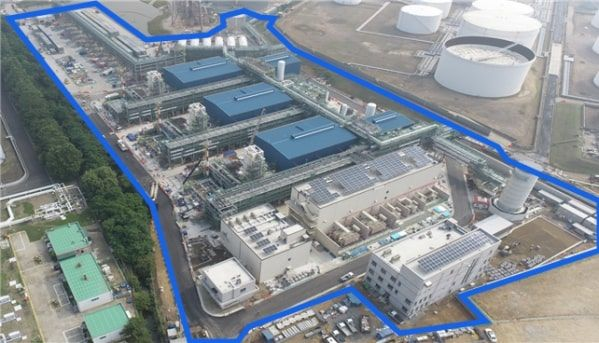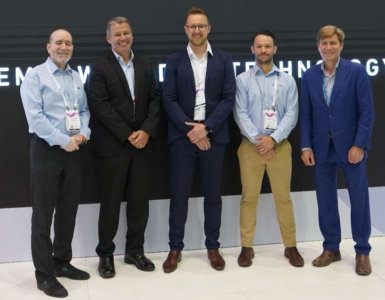SK Group promotes hydrogen business from production to charging.
The outline of SK Group’s hydrogen business, one of its future growth drivers, is gradually becoming visible. However, as the hydrogen business is in its early stages, it may take a considerable period of time for the Korean business group to turn a profit.
SK Group has recently begun its hydrogen business in earnest, centering on the production and charging of liquefied hydrogen, according to industry sources on Aug. 7. On Aug. 6, SK energy, a subsidiary of SK innovation, opened a hydrogen charging station for large hydrogen buses and trucks at Netruck House in Incheon. This is the second hydrogen charging station in Korea after the first one opened in Ulsan in April.
The Incheon hydrogen charging station is a 120 kg/h large-scale hydrogen charging station that can charge 60 heavy-duty trucks per day and 24 hydrogen passenger vehicles per hour. The Ulsan Sangae hydrogen charging station can also charge 40 heavy-duty trucks per day and 16 hydrogen passenger vehicles per hour.
🔥 What about we co-host a webinar? Let's educate, captivate, and convert the hydrogen economy!
Hydrogen Central is the global go-to online magazine for the hydrogen economy, we can help you host impactful webinars that become a global reference on your topic and are an evergreen source of leads. Click here to request more details
Hydrogen vehicles along with electric vehicles are considered a carbon-neutral alternative but a lack of charging stations has been cited as a disadvantage. With the launch of these stations, SK energy aims to further expand its hydrogen charging business and transform itself into a green energy platform provider.
SK E&S is in charge of hydrogen production at SK Group. SK E&S is currently building the world’s largest liquefied hydrogen plant at an SK incheon petrochem site, in the city of Incheon. The facility purifies gaseous hydrogen to a high purity and cools it to minus 253 degrees Celsius to make it liquid. It can produce 90 tons of liquefied hydrogen per day and 30,000 tons per year.
Liquefied hydrogen is one-eighth the volume of gaseous hydrogen. Therefore, it can be easily transported and befits fast charging. It is said to be a game changer in the spread of hydrogen mobility. It is especially suitable as a fuel for heavy-duty commercial vehicles that use a lot of hydrogen. When SK E&S’ liquefied hydrogen supply and distribution begins in earnest later this year, hydrogen mobility is expected to gain momentum.
SK Group is also ramping up its investment in alternative energy, including hydrogen. In SK Inc.’s Sustainability Report published this year, the company announced that it will invest a total of 12.4 trillion won in energy-related projects by 2025.
One of the limitations of hydrogen vehicles is that there is still not much demand for hydrogen vehicles, except for hydrogen buses and trucks. Hyundai Motor’s hydrogen passenger car Nexo sold only 2,927 units in the first half of this year, despite a government subsidy of 22.5 million won (US$17,073). SK energy’s hydrogen charging stations are aimed at large trucks as most hydrogen vehicles are commercial vehicles.
Meanwhile, it will take some time for the hydrogen business to bring substantial profits to SK Group. At the moment, the business group is investing money from its other businesses into hydrogen. While SK E&S is expected to start running a liquefied hydrogen plant at the end of this year, the plant is unlikely to turn profit anytime soon, according to industry sources.
READ the latest news shaping the hydrogen market at Hydrogen Central
SK Group Promotes Hydrogen Business from Production to Charging, August 8, 2023








